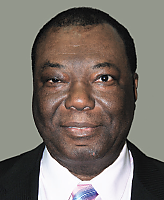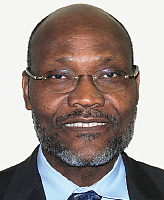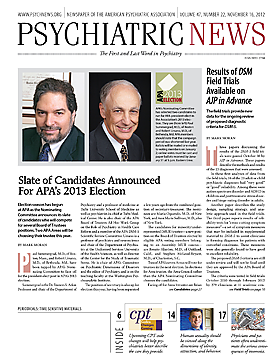The 2010 Haitian earthquake left massive trauma and loss in its wake, not only in Haiti but among the Haitian community in the United States.
In October, just after APA’s 2012 Institute on Psychiatric Services ended in Manhattan, psychiatrists and others who work with that community gathered across the river in Brooklyn to reflect on the quake’s mental health effects.
In general, reactions among community members are little different from reactions of other populations affected by a major tragedy, said Louis Belzie, M.D., M.P.H., health and palliative care at Brookdale University Hospital and Medical Center. These included depression and anxiety, as well as posttraumatic stress disorder, substance abuse, major depression, and panic disorder in the longer term. Most vulnerable to these symptoms were women, children, the elderly, and people who had a preexisting physical injury or preexisting mental illness.
“Those who sought help often looked for a Haitian psychiatrist but stayed home if they could not find one to help them,” said Belzie.
“Psychoeducation can expedite engagement by defining the process of therapy as well as patient expectations about it,” he noted. “It is also important for non-Haitian therapists to develop confidence in working with Haitians, particularly in the beginning stages of therapy.”
Working with Haitians may not be easy, even for Haitian-born psychiatrists, said Mardoche Sidor, M.D., a child and adolescent psychiatry fellow at Harvard Medical School–Cambridge Health alliance.
“They may not be able to tell you everything, even when asked, so form a relationship so that you can ask the questions the next time,” he said.
In Brooklyn, immediately after the Haitian quake, staff members from SUNY Downstate Medical Center used their outreach van to connect with churches and religious leaders in the immigrant Haitian community.
“We went to church basements and set up blood-pressure screenings,” recalled Michael Garrett, M.D., a clinical professor of psychiatry and vice chair for clinical services in the Department of Psychiatry at SUNY Downstate Medical Center. “That allowed us to informally engage people, and we found a number with serious problems, either physical or mental.”
People who needed services were referred to King’s County Hospital or to Downstate’s clinics.
Garrett and others received a grant from the Brooklyn Community Foundation to expand outreach to religious and community leaders, connect with social-service agencies to solve housing and other problems, and run educational support groups in churches.
Managing problems in the geriatric population of New York’s Haitian community required consideration of immigration status as well as age, said Georges Casimir, M.D., a clinical associate professor in the Geriatric Psychiatry Division at SUNY Downstate Medical Center in Brooklyn.
Someone who had immigrated decades ago and worked in the United States would have a better understanding of the American health care system and likely be receiving government benefits for the aged.
“But imagine an older person brought recently to the U.S. to care for their grandchildren while the parents were at work,” he said. “They might not be at ease here, go out very little, and face language barriers.”
Because they had not worked outside the home, they would not be eligible for Social Security disability payments or Medicare. They might also have culturally different ideas about disability and recovery.
Those individuals “are likely to present with somatic symptoms,” said Casimir. “To them, everything is physical.”
The quake killed about 360,000 Haitians, including six medical-school classmates of child psychiatrist Pierre Jean-Noel, M.D., M.B.A.
“Very young children, up to the age of 4, respond to the distress of their caregivers, so children’s responses depend of their caregiver’s responses,” said Jean-Noel, acting chair of psychiatry at Brookdale.
From ages 4 to 6, children may see the event as their fault, he said, and they may exhibit symptoms such as fear of separation, insomnia, and regression. Between ages 6 and 12, children can understand concrete explanations of the earthquake but may still present with physical symptoms, aggression, regressive behavior, fear, anxiety, and confusion.
Intervention is essential to prevent the child from seeing the world as a hostile and dangerous place, Jean-Noel said.
“The Haitian Mental Health Forum was a culturally specific public-education event customized for the Haitian community of Brooklyn,” said Annelle Primm, M.D., M.P.H., director of APA’s Office of Minority and National Affairs, which cosponsored the program. “The event was designed to respond to the needs of diverse and underserved communities, disseminate information about local mental health resources, and collaborate with other organizations and institutions.”



